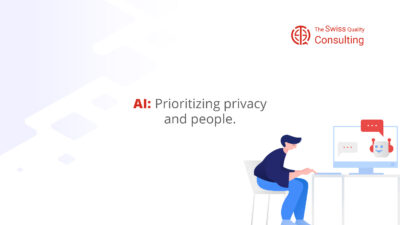Introduction to AI in Cognitive Enhancement
The use of AI in cognitive enhancement raises concerns about privacy and the security of sensitive cognitive data. As AI technology advances, its applications in cognitive enhancement have become more prevalent, offering unprecedented opportunities for improving human cognitive functions. This integration of AI and human cognition is particularly significant in dynamic regions such as Saudi Arabia and the UAE, where technological innovation is a key driver of economic and social development.
AI-driven cognitive enhancement involves the use of machine learning algorithms to augment human cognitive abilities. This can range from improving memory and learning capabilities to enhancing decision-making and problem-solving skills. By analyzing vast amounts of cognitive data, AI systems can provide personalized recommendations and interventions tailored to individual needs. However, the collection and processing of such sensitive data raise critical privacy and security concerns that must be addressed to ensure the responsible use of AI in cognitive enhancement.
In regions like Riyadh and Dubai, where there is a strong emphasis on leveraging modern technology for various applications, the ethical implications of AI in cognitive enhancement are particularly relevant. Business executives, mid-level managers, and entrepreneurs must navigate these challenges to harness the full potential of AI while safeguarding individual privacy and data security. This article explores the benefits and challenges of AI in cognitive enhancement, with a focus on privacy and security considerations.
Benefits of AI in Cognitive Enhancement
AI-driven cognitive enhancement offers numerous benefits that can significantly impact personal and professional development. One of the primary advantages is the ability to provide personalized cognitive training programs. AI algorithms can analyze individual cognitive profiles and develop customized training modules that target specific areas for improvement. This personalized approach ensures that cognitive enhancement efforts are tailored to the unique needs and strengths of each individual, leading to more effective outcomes.
In the context of executive coaching services, AI can play a crucial role in enhancing leadership and management skills. By providing data-driven insights and recommendations, AI systems can help executives identify areas for improvement and develop strategies for personal and professional growth. This can lead to more effective decision-making, improved team management, and overall business success. In regions like Saudi Arabia and the UAE, where leadership development is a strategic priority, AI-driven cognitive enhancement can support the cultivation of future business leaders.
Furthermore, AI in cognitive enhancement can contribute to the advancement of education and training programs. AI-powered tools can adapt to individual learning styles, providing personalized feedback and support. This can enhance the learning experience, improve retention rates, and accelerate skill acquisition. In Dubai and Riyadh, where there is a strong focus on education and workforce development, AI-driven cognitive enhancement can play a pivotal role in preparing individuals for the demands of the modern job market.
Privacy Concerns in AI-Driven Cognitive Enhancement
While the benefits of AI in cognitive enhancement are substantial, the use of AI to process and analyze sensitive cognitive data raises significant privacy concerns. Cognitive data includes information about an individual’s thought processes, memory, decision-making patterns, and other aspects of mental functioning. The collection and storage of such data can pose risks if not properly managed and secured.
One of the primary concerns is the potential for unauthorized access to cognitive data. If cognitive data is not adequately protected, it can be vulnerable to cyberattacks, leading to data breaches and misuse. This is particularly concerning in regions like Saudi Arabia and the UAE, where digital transformation initiatives are rapidly advancing, increasing the volume of data generated and processed. To mitigate these risks, it is essential to implement robust data security measures, including encryption, access controls, and regular security audits.
Another privacy concern is the potential for misuse of cognitive data by organizations. Without strict regulatory frameworks, there is a risk that cognitive data could be used for purposes beyond the intended scope, such as targeted advertising or surveillance. This can lead to a loss of trust among individuals and hinder the adoption of AI-driven cognitive enhancement technologies. To address this, policymakers in Riyadh and Dubai must establish clear guidelines and regulations governing the use of cognitive data, ensuring that it is used ethically and transparently.
Ensuring Data Security in Cognitive Enhancement Applications
To address the privacy concerns associated with AI in cognitive enhancement, it is crucial to implement comprehensive data security strategies. One of the key components of data security is ensuring that cognitive data is encrypted both at rest and in transit. Encryption ensures that even if data is intercepted or accessed without authorization, it cannot be read or used by unauthorized parties. This is particularly important for protecting sensitive cognitive data from cyber threats.
In addition to encryption, access controls are essential for safeguarding cognitive data. Access controls limit who can view and interact with cognitive data, ensuring that only authorized personnel can access sensitive information. This can be achieved through multi-factor authentication, role-based access controls, and regular access reviews. By restricting access to cognitive data, organizations can minimize the risk of unauthorized use and data breaches.
Furthermore, regular security audits and assessments are critical for maintaining the integrity of cognitive enhancement applications. Security audits involve reviewing and evaluating the security measures in place to identify potential vulnerabilities and areas for improvement. By conducting regular audits, organizations can ensure that their data security practices remain up-to-date and effective in the face of evolving cyber threats. In regions like Dubai and Riyadh, where there is a strong emphasis on digital innovation, ongoing security assessments are essential for maintaining public trust in AI-driven cognitive enhancement technologies.
Ethical Considerations in AI-Driven Cognitive Enhancement
Beyond privacy and security, the ethical implications of AI-driven cognitive enhancement must be carefully considered. One of the key ethical concerns is ensuring that cognitive enhancement technologies are used to benefit individuals and society as a whole, rather than exacerbating existing inequalities. For example, access to AI-driven cognitive enhancement tools should not be limited to certain socio-economic groups, as this could widen the gap between those who have access to advanced technologies and those who do not.
Another ethical consideration is ensuring that individuals have control over their cognitive data. This includes the ability to consent to the collection and use of their data, as well as the right to access, correct, and delete their data. Empowering individuals with control over their cognitive data promotes transparency and trust, which are essential for the responsible adoption of AI-driven cognitive enhancement technologies.
Moreover, the development and deployment of AI in cognitive enhancement should be guided by ethical principles that prioritize human well-being. This includes ensuring that AI algorithms are designed to support and enhance human cognitive functions, rather than replacing or diminishing them. By focusing on augmenting human capabilities, AI-driven cognitive enhancement can contribute to personal and professional growth, leading to more fulfilling and productive lives.
Conclusion: Balancing Innovation with Responsibility
In conclusion, the use of AI in cognitive enhancement offers significant potential for improving human cognitive functions, supporting personal and professional development, and driving innovation. However, it also raises critical privacy and security concerns that must be addressed to ensure the responsible use of AI-driven cognitive enhancement technologies. By implementing robust data security measures, establishing clear regulatory frameworks, and adhering to ethical principles, stakeholders in regions like Saudi Arabia, the UAE, Riyadh, and Dubai can harness the benefits of AI while safeguarding individual privacy and data security.
As AI technology continues to evolve, it is essential to balance innovation with responsibility, ensuring that the integration of AI in cognitive enhancement promotes human well-being and societal progress. By fostering a collaborative and ethical approach to AI-driven cognitive enhancement, we can unlock the full potential of this transformative technology and create a future where human and machine intelligence coexist harmoniously.
—
#AIinCognitiveEnhancement #PrivacyConcerns #CognitiveDataSecurity #ArtificialIntelligence #Blockchain #TheMetaverse #ExecutiveCoaching #GenerativeAI #ModernTechnology #BusinessSuccess #LeadershipSkills #ProjectManagement #SaudiArabia #UAE #Riyadh #Dubai































